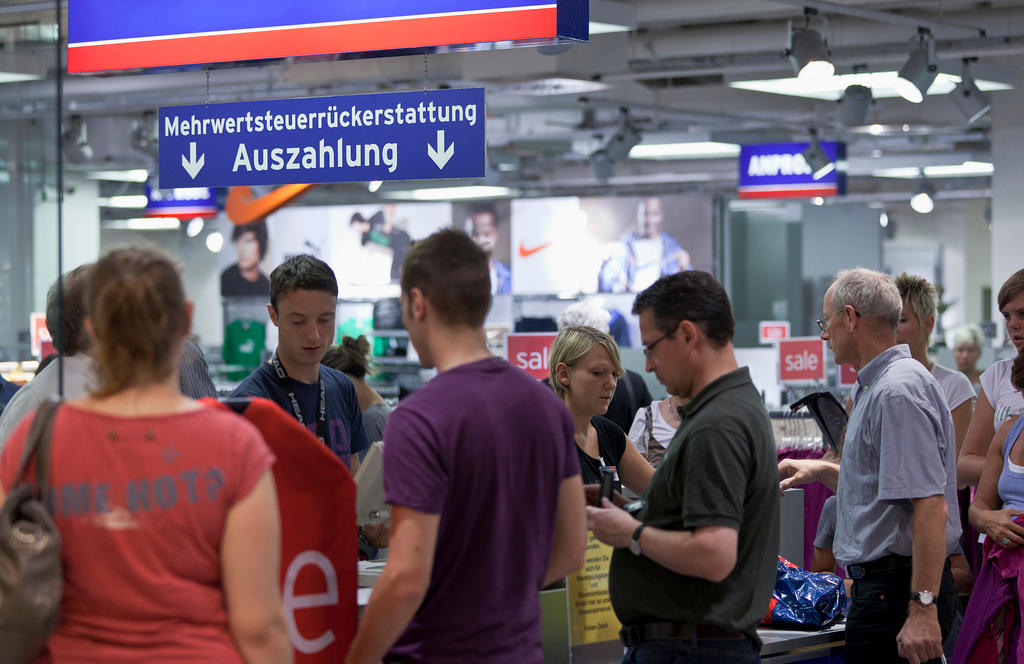Meet the man who tracks Swiss spending habits

Why are the Swiss so fond of cross-border shopping? What has recently changed in their eating habits? These and other consumer trends are the domain of Thomas Rudolph, a German who has made Switzerland his focus of interest.
As a doctoral student, Thomas RudolphExternal link had not been in Switzerland long when he went to carry out a study in St Margarethen, a town in canton St Gallen near the border with Austria, in 1992. He was actually researching the look-and-feel of retail outlets. So he asked a retailer if he could query a hundred customers.
“That is something I’ll never forget: on that day, there came hordes of Austrians and Germans buying chocolate, noodles and coffee. Some of them bought 20, 30 chocolate bars, 15 packages of noodles,” he relates.

Yet cross-border shopping has swung in the opposite direction in recent decades. That is, since the Swiss franc has been worth more. Rudolph is now a professor of marketing and international trade management and holder of the Gottlieb Duttweiler chair at the University of St GallenExternal link. But he has never been able to give up the issue he started with. He and his team of researchers regularly publish studies of cross-border shopping.
Liked it in Switzerland
Rudolph, who has become a Swiss citizen, studied in Mannheim. When he applied to do a doctorate at various institutions, he got an offer from St Gallen. “It suited me, and I ended up here for good.”

Admittedly, he has thought of leaving Switzerland a couple of times. But he has only managed to spend three half-year sabbaticals at universities in the US and New Zealand. “My plan was always to come back.” When he started a family, he and his wife were both clear that they were in Switzerland for the long haul. “And things worked out very well for me at St Gallen. So I am very pleased to have this focus for my life, Switzerland,” he says.
Ten billion francs gone
Now he is researching the consumption patterns of shoppers from Switzerland and the topic of business model transformation. This, he explains, involves questions like: “Do customers feel inspired while shopping? How can we measure their inspiration?” as well as “What ideas do we develop, in order to react to this behaviour?” His latest study on cross-border shopping by Swiss in 2017 found that the phenomenon is still current, and has slightly increased. In the areas he examined – food, clothing, furniture, sporting goods and home electronics, both on the retail floor and online – almost CHF10 billion ($10 billion) flowed from Switzerland to neighbouring economies.
A “key finding” of Rudolph’s research is also that “cross-border shopping today is growing strongly online”. Not only the neighbouring countries are playing a major role here, but also China, with a platform like Ali-Express. “Worldwide competition is only a click away.”
Price comes first among the reasons Rudolph cites for cross-border shopping. The exchange rate would have to go up to CHF1.40 per euro for cross-border prices to lose their attraction for Swiss shoppers. Secondly, people want more of a variety of products like sausages or bread, and this lures Swiss across the border. What’s more, a shopping spree across the border becomes a family outing.
+ Meet the man trying to make Switzerland less expensive
Switzerland could do better
Rudolph and his team also think about how cross-border shopping could be reduced. The main point is to avoid a price war. “It will only work if you offer products and ranges that are different. That is to say, there need to be more home brands, more local and regional product ranges. Tastes are different in Switzerland – for example as regards bread and cheese – and more attention needs to be paid to that.”
Second, the service side could do with some improvement. Providing the customer with advice shouldn’t necessarily come at a cost. “I can support the customer’s selection of products in advance with a good Internet platform,” he suggests as an example. As a second point, he mentions package tracking as something that could be offered to customers.
At present, too, customer interest would be stimulated by the theme of sustainability. “Consumers are expecting innovations here. And they will probably pay well for them, if they can be convinced.”
Too much Migros influence?
The research findings of the Gottlieb Duttweiler chair, named after the founder of the Migros supermarket chain and financed by the company, benefit Migros too. Thomas Rudolph himself has been a member of the board of Migros since 2003. That raises questions about his objectivity as a researcher. “From my point of view there’s no conflict of interest”, he says. Swiss business is very interested in knowing about the phenomenon of cross-border shopping and customer behaviour. In their studies they do not provide any explicit advice. “Every company that reads this study just has to think what it should be doing to get ahead.” Besides, 27 other firms have associated themselves as partners with his research centre.

How the Swiss eat
Another wide field of research contributed to by Rudolph is the eating habits of Swiss. What do they eat, and where? For him, those are the key questions. One noticeable trend involves breakfast: “Instead of at home, you get breakfast ‘on the go’ or even at workplace.”
Lunch is also losing ground in Switzerland. Whereas families used to sit down and listen to the 12:30 news together, today things have changed completely, “from an hour and a half to 20 or 30 minutes now, or just at a desk.” Similar changes are visible in other countries, but in Switzerland it’s particularly striking.
Yet compared to other nationalities, the Swiss are very aware of healthy eating. “I was surprised to see how many Swiss diet,” says Rudolph. “The interest in healthy and good-quality eating is particularly noticeable here in Switzerland.”
This is reflected in the wide range of restaurants the Swiss have to choose from. We may not notice that so much from an at-home perspective, but Rudolph has a story of his own to tell: “When I moved into my first home in St Gallen, I looked in the phone book – we still did that then – and found that there are just oodles of restaurants here. And this was in a town with a population of 80,000. In Germany, there would never be a range of choice like that!”
Also in the “Studying Switzerland” series:

More
Why an Australian scientist is finding out more about Lake Geneva
Translated by Terence MacNamee

In compliance with the JTI standards
More: SWI swissinfo.ch certified by the Journalism Trust Initiative




You can find an overview of ongoing debates with our journalists here. Please join us!
If you want to start a conversation about a topic raised in this article or want to report factual errors, email us at english@swissinfo.ch.